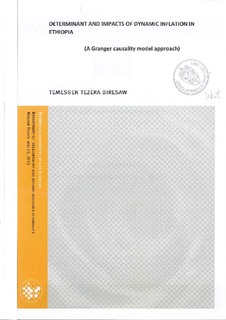| dc.description.abstract | This thesis uses quarterly data for the period 1998-2010 to investigate the determinant and impacts of dynamic inflation in Ethiopia. By using Granger causality model approach four testable hypotheses are investigated: (1) does the money supply growth Granger-cause inflation? (2) Does currency devaluation Granger cause inflation? (3) Does inflation affect economic growth? And (4) Does oil price Granger cause of inflation?
The empirical results suggest that there existed a bi-directional causality between broad money supply growth and inflation and unidirectional causality between currency devaluation and inflation as well as oil price and inflation. For the complete sample period, the causality running from inflation to broad money supply growth was stronger than that the other way round. This result is consistent with the view that in a high inflationary economy, inflation does have a feedback effect on money supply growth and this generates a self-sustaining inflationary process. On the other hand relationship between inflation and economic growth, the results shows that there was no short-run causality from inflation to economic growth for the complete sample period.
Key words: Inflation, Money Growth, Devaluation, Economic Growth, Granger-Causality, Ethiopia | no_NO |
